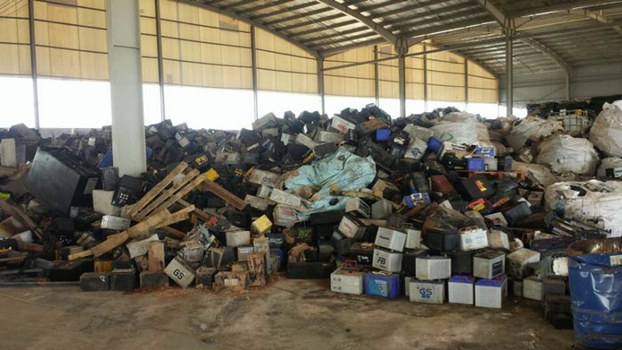




Authorities in Laos have ordered the Hokeng Metal Processing Company to suspend operations at an e-waste plant in the Vientiane Special Economic Zone because the company failed to install proper pollution controls, RFA’s Lao Service has learned.
“The government has suspended the plant until it improves the pollution management system in order to make sure that it does not cause negative impacts to people and the environment,” said a Lao official who spoke to RFA on condition of anonymity.
According to a June 14 notice issued by Phet Phomphiphack, the Lao minister and head of the prime minister's office, to the relevant government authorities and obtained by RFA, the plant is barred from importing any more e-waste and nearly 50 containers of e-waste must be quarantined.
“The plant is not allowed to import more e-waste because it has a negative impact on people and the environment,” the notice states. “Forty-eight containers of e-waste which were recently imported must be kept in safety, and they must not be used, produced, or processed.”
In addition, Phomphiphack ordered the establishment of a committee to inspect the Hokeng plant and enforce pollution mitigation measures.
“The government assigned the ministries of industry and commerce and of natural resources and the environment, in cooperation with other relevant sectors, to establish an ad hoc committee to inspect and ensure that standards are met for dangerous pollution, and to take measures against the plant so it will improve its standards and evaluate the environmental and social impacts,” the notice states.
While the Hokeng plant is the initial target of the government’s action, other e-waste plants in Laos are also facing additional scrutiny, and new e-waste plants are banned, according to the notice.
Khampadith Khammounheuang, director general of the Ministry of Natural Resources and Environment, refused to answer questions about the plant and the notice, but other sources told RFA that government officials had inspected the plant on May 20. The plant was also visited in May by U.S. Ambassador to Laos Daniel Clune, sources told RFA.
Executives with Hokeng did not return calls seeking comment.
Local concerns
Hokeng Metal Processing is a subsidiary of Sunrise Metal International, according to Sunrise Metal’s website. While Sunrise is headquartered in New Zealand, it is a part owner of Hokeng, which has operated for five years since winning approval by the government.
Sunrise is also associated with Hong Kong-based Xinli Metals.
An RFA report in April revealed local people’s concerns about the plant where cast-off electronics are recycled for their valuable metals.
Located in Nonthong village in Vientiane’s Saythany district, the plant reclaims copper, lead, and other valuable minerals from computers, televisions, batteries, and other cast-off electronics, and then resells the metals to customers worldwide.
At the time of the initial report, villagers told RFA that they were worried about pollution from the plant.
“I see the plant drain the wastewater into the surrounding fields, and during the rainy season it spreads to other areas,” said one resident who spoke on condition of anonymity. “The plant has done this for a few years.”
In addition to the fear of water contamination, residents near the plant say the smell is horrible.
“Villagers have trouble with the bad smells day and night,” another villager told RFA. “When we are home, we must stay inside the house with the windows closed. People driving past that area also smell the burning, and it seriously upsets their noses.”
Reported by RFA's Lao Service. Translated by Ounkeo Souksavanh. Written in English by Brooks Boliek.